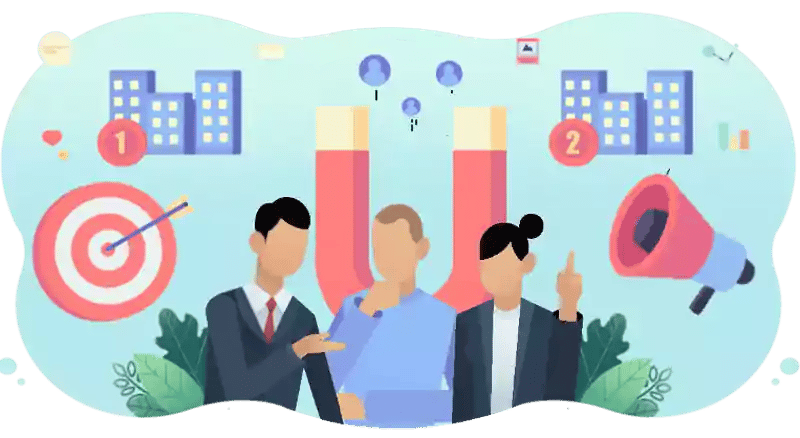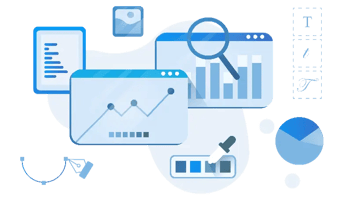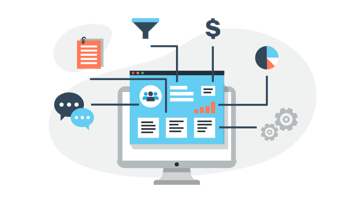How Do I Find a Web Design Agency for My Business?
In the cutthroat world of online competition, your website is your digital storefront. Think about it: Would you open a physical store in a dark alley, hidden from potential customers? Absolutely not! Yet countless businesses unknowingly relegate themselves to the online equivalent—a poorly designed website that struggles to attract visitors, let alone convert them into paying customers.
That's where a stellar web design agency swoops in, wielding the power of superstar architects and interior designers. They don't just create a visually appealing online space; they craft an experience that compels visitors to step inside, explore your offerings, and ultimately become loyal customers.

1. Define Your Project
Before you hire an agency, a little introspection is required. Ask yourself: What is your website's ultimate purpose? Are you aiming to capture a flood of leads, convert visitors into paying customers, or simply establish a strong online presence for brand recognition? Identifying your primary goals acts as a roadmap for your agency search, ensuring you select a team with proven experience in achieving similar objectives.
For instance, if lead generation is your top priority, you'll want to find an agency adept at crafting contact forms, strategically placed calls to action, and landing pages designed to maximize visitor conversion. On the other hand, if e-commerce is your game plan, prioritizing an agency with a strong track record in building user-friendly online stores optimized for seamless navigation and checkout becomes crucial.
Next, let's talk budget! Honesty is the best policy here. Web design costs can vary depending on project complexity and agency experience. Establishing a realistic budget upfront ensures agencies propose solutions that align with your financial resources.
A Clutch report suggests that the average cost of a website redesign in the United States can range from $2,500 to $10,000+ depending on project complexity.
Don't be afraid to discuss pricing structures openly and explore options that fit your needs. Remember, a well-designed website is an investment, not just an expense. It's a powerful tool that can drive long-term growth for your business.
2. Research Web Design Agencies
The search for your ideal web design agency doesn't have to be overwhelming. The internet offers a wealth of resources to help you find the perfect fit.
Leverage Search Engines
Start by using search engines strategically. Craft keywords that reflect your needs, such as "web design agencies specializing in [your industry]" or "e-commerce website development companies." These searches will generate a list of agencies vying for your attention. Take your time to explore their websites, paying close attention to agencies whose design aesthetic aligns with your vision.
Explore Industry Platforms
Look beyond traditional search results and explore established platforms dedicated to connecting businesses with qualified agencies. Platforms like Clutch and DesignRush offer comprehensive listings of vetted web design agencies. These platforms provide valuable insights like client reviews, project portfolios, and even location filters to find agencies in your area.
Seek Recognition and Awards
Many design agencies proudly display industry awards and recognition on their websites. These awards can serve as a mark of excellence, indicating an agency's commitment to quality and innovation in web design.
3. Evaluate Agency Portfolios
The portfolio is a web design agency's crown jewel, showcasing its creative capabilities and technical expertise. Before diving into consultations, dedicate time to scrutinize agency portfolios. This step will help you assess if their design aesthetic aligns with your vision and if they possess the industry-specific experience to deliver a website that resonates with your target audience.
Assess Design Aesthetic
A website's design should be visually appealing and strategically crafted to evoke specific emotions and guide user behavior. As you browse agency portfolios, pay close attention to the following:
-
Visual Style: Does the agency's overall design aesthetic resonate with your brand identity? Are their websites clean and modern, or do they favor a more traditional or playful approach?
-
User Interface (UI) Design: How user-friendly are the websites in the portfolio? Are menus intuitive, and is navigation clear and logical? A well-designed website should be easy for visitors to navigate, regardless of their technical savviness.
-
User Experience (UX) Design: Look beyond aesthetics and consider how the websites make users feel. Do they encourage exploration and engagement, or do they feel cluttered and overwhelming? A positive user experience is crucial for keeping visitors on your website and ultimately achieving your goals.
Companies that prioritize web design can experience a conversion rate increase of up to 200%.
Industry Experience
Understanding an agency's industry experience can be just as important as assessing its design style. Agencies that have demonstrably tackled projects similar to yours are likely to possess a deeper understanding of your target audience and the specific challenges and opportunities within your industry.
Here's how to evaluate an agency's industry experience:
-
Industry-Specific Portfolios: Many agencies showcase their work categorized by industry. Seek agencies with a proven track record of success in your field. Looking at websites they've built for businesses similar to yours will give you a strong sense of their capabilities.
-
Case Studies: Explore case studies on the agency's website. These studies often outline the specific challenges the client faces and the strategies the agency employs to achieve success. Pay close attention to case studies that mirror your own business goals.
-
Client Testimonials: Don't underestimate the power of client testimonials. Reading positive feedback from satisfied clients in your industry can provide valuable insights into the agency's work ethic, communication style, and ability to deliver results.
4. Schedule Consultations
Having meticulously researched and assessed agency portfolios, you've likely compiled a shortlist of 3-5 agencies that pique your interest. Now comes the crucial step of scheduling consultations. These consultations offer invaluable opportunities to delve deeper, assess communication styles, and better understand each agency's approach to web design.
Shortlisting Potential Agencies
Remember, quality over quantity is essential here. Don't overwhelm yourself by contacting a dozen agencies. Instead, focus on the shortlisted agencies whose portfolios resonate with your brand identity and demonstrate experience within your industry.
While shortlisting, consider the following:
-
Alignment with Goals: Do the agencies' past projects align with your website's primary goals (e.g., lead generation, e-commerce sales)?
-
Design Project Approaches: Is the agency following a, often costly and time-consuming, traditional approach to web design or supporting a needs/results-based, growth-driven design approach?
-
Budgetary Considerations: Do the agencies' pricing structures seem realistic compared to your established budget?
-
Location (Optional): While location may not be a deal-breaker, consider whether working with a local agency offers communication or logistical advantages.
The Importance of Consultations
Consultations aren't simply sales pitches. They are two-way conversations that allow you to assess the agency's suitability beyond its portfolio. Here's why consultations are vital:
-
Gauging Communication Style: Consultations provide a platform to assess the agency's communication style. Do they listen actively to your needs and answer your questions? Effective communication is crucial for a successful project, so ensure you feel comfortable and heard.
-
Understanding the Design Process: Consultations allow you to delve into the agency's design process. Do they involve you collaboratively or take a more hands-off approach? Understanding their workflow will help you determine if it aligns with your desired level of involvement.
-
Addressing Specific Needs: Consultations are your chance to discuss any specific needs or concerns. This could range from content creation strategies to search engine optimization (SEO) best practices. A qualified agency will readily address your questions and concerns. website grader
5. Ask the Right Questions
Consultations allow you to delve deeper and assess the agency's expertise beyond their portfolio. Come prepared with a list of insightful questions to truly gauge their knowledge, approach, and suitability for your project. Here are some key questions to consider:
-
Content Management System (CMS) Experience: Will the agency build your website on a user-friendly CMS platform like HubSpot or WordPress? This allows you to easily update content in the future without relying on the agency.
-
Mobile Responsiveness Optimization: In today's mobile-first world, a website that seamlessly adapts to all screen sizes is crucial. Ask the agency about their mobile responsiveness strategies and how they ensure optimal user experience across devices.
-
Website Security Measures: Data security is paramount. Inquire about the agency's security protocols to protect your website and visitor information. This could include secure socket layer (SSL) encryption and regular vulnerability scans.
-
Search Engine Optimization (SEO) Expertise: Organic search visibility is vital for website traffic. Ask the agency about their SEO approach and how they optimize websites for search engines.
-
Web Accessibility: Web accessibility is crucial today, as your website visitors will have different needs. Ensure your chosen agency leverages web accessibility tools and builds a website accessible to all.
-
Timeline and Project Management: Discuss the agency's typical project timelines and their approach to project management. Will you have a designated point of contact, and how will communication be handled throughout the project?
-
Reference Checks: Don't hesitate to request references from past clients in your industry. Speaking directly with satisfied clients can provide valuable insights into the agency's work ethic, communication style, and ability to deliver results.
A website with a slow loading speed can experience a bounce rate (percentage of visitors who leave immediately) as high as 80% (Crazy Egg).
6. Compare Proposals and Costs
After insightful consultations, you'll likely receive formal proposals from shortlisted agencies. These proposals serve as a roadmap for your project, outlining the scope of work, pricing structure, and timeline. Carefully comparing these proposals is crucial for making an informed decision that aligns with your budget and project goals.
The Importance of Clear Proposals
A clear and detailed proposal is a hallmark of a professional agency. It should leave no room for ambiguity and ensure you fully understand the services offered deliverables, and associated costs. Here's what to look for in a well-crafted proposal:
-
Project Scope: The proposal should clearly define the project scope, outlining the specific deliverables included (e.g., website design, development, content creation). Ensure the scope aligns with your initial discussions and reflects your website's core functionalities.
-
Pricing Structure: Transparency in pricing is critical. The proposal should detail all associated costs, including hourly rates, project fees, or additional charges (e.g., stock photos domain registration). Don't be afraid to clarify any pricing structures that seem unclear.
-
Timeline and Milestones: A well-defined timeline with clear milestones is essential. The proposal should outline the anticipated time frame for each project stage, from initial design concepts to website launch. Clear milestones allow you to track progress and ensure the project stays on schedule.
-
Revision Policy: Websites are often collaborative efforts. The proposal should outline the agency's revision policy, specifying the revisions included and any associated fees for additional changes.
Consider the value proposition of each proposal and prioritize the agency that demonstrates a clear understanding of your vision and offers a solution that delivers long-term benefits for your business.
7. Choose the Right Fit
Selecting a web design agency goes beyond simply picking the cheapest option. While budget is certainly a factor, prioritizing the right fit is paramount for a successful outcome. Here's why looking beyond just price is essential:
Teamwork Makes the Dream Work
Your website is a vital asset for your business. The agency you choose will become a temporary extension of your team. Therefore, selecting an agency with a team you feel comfortable collaborating with is crucial. During consultations, pay attention to:
-
Communication Style: Do you feel heard and understood by the agency team? Is their communication style clear, concise, and professional? Effective communication throughout the project is essential for a smooth and successful collaboration.
-
Responsiveness: How quickly do they respond to your questions and concerns? Timely communication demonstrates their respect for your time and project.
-
Expertise and Experience: Does the team possess the specific expertise and experience required for your project? Look for a team with a proven track record of success in projects similar to yours.
Building Rapport and Trust
The best client-agency relationships are built on trust and mutual respect. Consultations offer valuable insight into the agency's culture and working style. Here are some signs that indicate a good fit:
-
Shared Vision: Do the agency's team members seem genuinely enthusiastic about your project and vision? Do they ask insightful questions and demonstrate a clear understanding of your goals?
-
Collaborative Approach: Does the agency encourage your input and value your feedback throughout the design process? A collaborative approach ensures the final product reflects your brand identity and resonates with your target audience.
-
Confidence and Transparency: A confident agency will be transparent about its process and capabilities. They should be able to clarify your concerns and provide honest feedback.
Price is undoubtedly important, but don't underestimate the value of finding an agency you feel comfortable working with. By prioritizing team compatibility, communication style, and a shared vision, you'll be well on your way to selecting a partner who can transform your website into a powerful growth engine for your business.
Unleash Your Website's Growth Potential
Finding the perfect web design agency is an investment in your business's future. By following these steps, you've equipped yourself with the knowledge to navigate the selection process confidently.
Ready to get your web design started? Look no further than Aspiration Marketing! Our talented team of web design experts is passionate about crafting engaging, user-friendly websites that drive results. We utilize a cutting-edge Growth-Driven Design (GDD) approach, focusing on continuous optimization to ensure your website constantly evolves to meet your business goals.
Contact Aspiration Marketing today for a free consultation. Let's discuss how we can transform your online presence and propel your business forward!
This content is also available in:
- German: Wie finde ich eine Web-Design-Agentur für mein Unternehmen?
- Spanish: ¿Cómo puedo encontrar una agencia de diseño web para mi empresa?
- French: Comment choisir la bonne agence web pour son entreprise ?
- Italian: Come trovare un'agenzia di web design per la propria azienda?
- Romanian: Cum găsesc o agenție de web design pentru afacerea mea?
- Chinese: 如何为企业寻找网页设计公司?










Leave a Comment